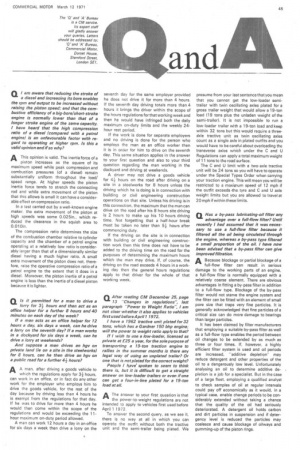I am aware that reducing the stroke of a diesel
Page 47

If you've noticed an error in this article please click here to report it so we can fix it.
and increasing its bore enables the rpm and output to be increased without raising the piston speed; and that the combustive efficiency of a big-bore/short-stroke engine is normally lower than that of a longer stroke engine of the same capacity. I have heard that the high compression ratio of a diesel (compared with a petrol engine) is an unfavourable factor with regard to operating at higher rpm. Is this a valid opinion and if so why?
AThis opinion is valid. The inertia force of a
piston increases as the square of its maximum speed while peak compression and combustion pressures of a diesel) remain substantially uniform throughout the load/ speed range. At higher speeds the piston inertia force tends to stretch the connecting rod and while extra movement of the piston that this allows is small it can have a considerable effect on compression ratio, In a test carried out by a well-known engine maker, the extra movement of the piston at high speeds was some 0.025in., which reduced the clearance in the squish area to 0.010in.
The compression ratio determines the size of the combustion chamber relative to cylinder capacity and the chamber of a petrol engine operating at a relatively low ratio is considerably larger than that of a dimensionally similar diesel having a much higher ratio. A small extra movement of the piston does not, therefore, raise the operative compression ratio of a petrol engine to the extent that it does in a diesel. Moreover, the piston inertia of a petrol engine is less than the inertia of a diesel piston because it is lighter.






















































































